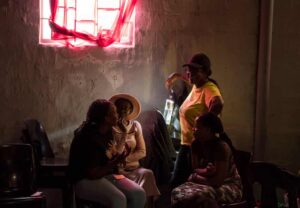
Red curtains and ceiling drapes create a pink-tinged glow inside the run-down community centre, an hour south of Johannesburg, where Palesa Hlohlolo tells her neighbours about her experiences of domestic violence.
“I’m not a punching bag and I’ll never be one. For anyone,” she says, grabbing a tissue from a rapidly emptying box.
Every Wednesday, 30 women meet here at Orange Farm township for an hour, their notebooks decorated with stickers spelling out “COURRAGE”. Each letter represents a session’s theme in an eight-week group counselling programme, which asks participants to reframe trauma as stories of survival and strength.
It is an idea from Ncazelo Ncube-Mlilo, a Zimbabwean psychologist who has dedicated her career to developing “culturally sensitive” therapeutic tools.
Her charity, Phola, reaches more than 10,000 women, men and children in townships around Johannesburg every year. And the need is immense: one in four experience depression or anxiety in a country which remains plagued with high rates of unemployment and violence, and ranks among the lowest globally for mental wellbeing.
Penelope Mokgele, 43, talks about her son’s drug use. “It’s a pattern: my brother used to smoke, and now it’s my son,” she says.
“I think we are hurt as black people, and we bottle it up. The more we talk – not just as a person, but as a family, a group – the more it will help.”
Hlohlolo raises her hand. Thirteen years ago, she was caught in the crossfire of a shooting on her way to work. She woke up in a body bag, having been taken for dead. Seriously injured, it took her months to relearn how to walk.
